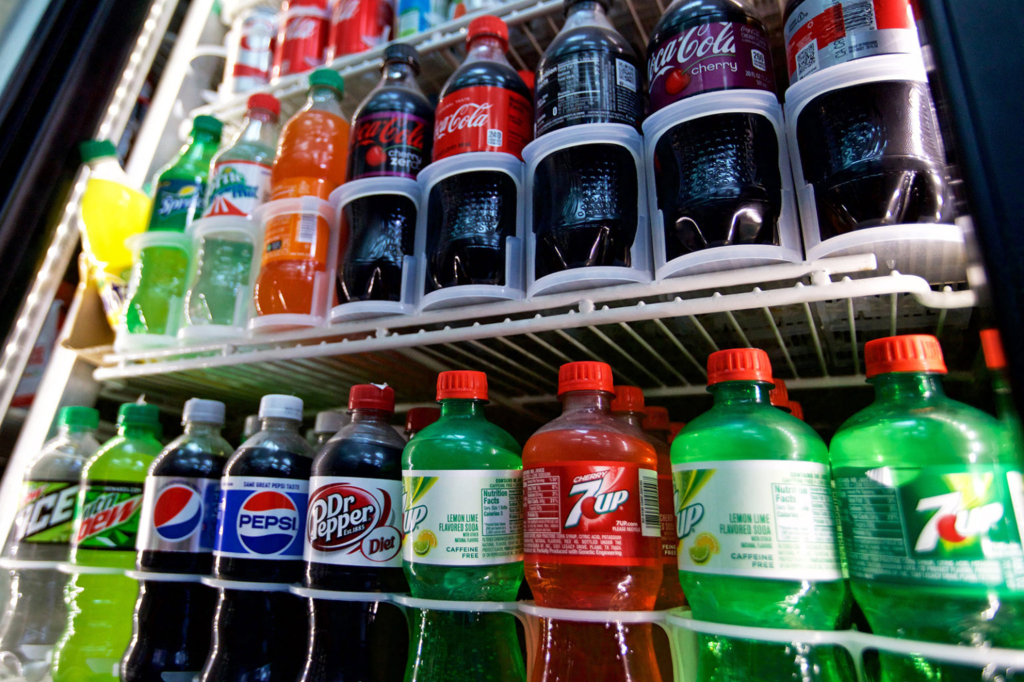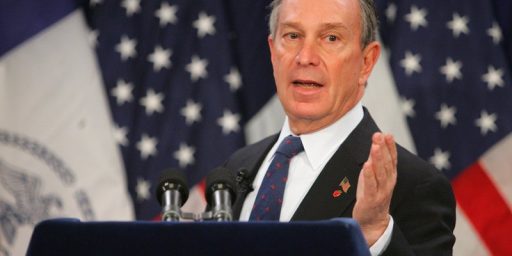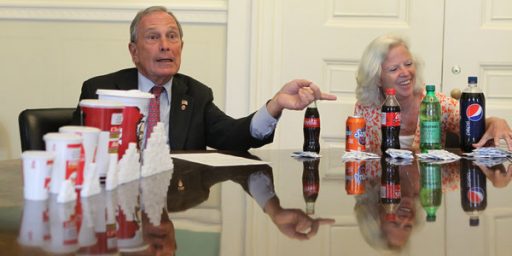California Bans New Soda Taxes
California's legislature has moved to block localities from imposing taxes on soda and other sugary drinks.

After pioneering the idea of imposing taxes on soda and other sugary drinks, California is stepping away:
The beverage industry scored a defining victory in its battle against soda taxes this week as California lawmakers voted to bar future local taxes on sugary drinks.
The state had been a hotbed for the soda-tax movement, having passed laws designed to slash soda drinking in four jurisdictions. But under the fast-moving ban introduced June 23 and signed into law five days later, no new food or beverage taxes can be passed in the state until 2031 at the earliest.
The law represents a significant, if long-anticipated, shift among the nation’s soda makers, who have previously fought taxes, city by city, and expended millions of dollars in the process. Soda companies say the statewide bans more efficiently protect jobs and businesses that could be hurt by local tax laws.
But public-health advocates argue the state preemptions undermine the will and health of voters, pointing out that similar tactics have been embraced by tobacco companies and fast-food chains to fend off everything from cigarette taxes to menu labels.4
Now backers of the soda tax movement are searching for other options in California — and bracing for similar fights across the country.
“There’s a fear that as California goes, so goes the nation,” said Sabrina Adler, a senior staff attorney at ChangeLab Solutions, which develops public-health policies. “This could be the beginning of further preemption in other states.”
Advocates say the tactical shift from soda makers was not unexpected, but the speed of the California ban caught many by surprise. California has long been seen as the vanguard of the soda-tax movement, which seeks to slash consumption of sugary drinks while raising revenue for local governments.
Soda is one of the primary sources of calories and added sugars in the American diet, and cities that have passed taxes — such as Berkeley, Calif., which became the first in 2014 — have seen consumption fall. According to the American Heart Association, eight cities now have soda taxes on the books, four of them in California, and a number of other cities in the state were readying ballot measures.\
But while California’s existing taxes will remain in place under this week’s ban, others in the pipeline can no longer proceed. That will protect consumers and retailers from unexpected price hikes, argues the American Beverage Association, the trade group for soda companies.
Stores in other cities that passed soda taxes have faced sharp sales declines, risking jobs, the ABA has said. The group has also argued that soda taxes disproportionately affect low-income shoppers, who spend a larger portion of their income on food and beverages.
“Our aim is to help working families by preventing unfair increases to their grocery bills,” said William Dermody, the ABA’s vice president of policy, in a statement. “At the same time, we’re working with the public health community and government officials to help Californians reduce sugar consumption in ways that don’t cost jobs or hurt the small businesses that are so important to local communities.”
But such choices should be left to local communities, argues Carter Headrick, the director of state and local obesity policy at the American Heart Association, which fought the ban. Cities and towns are in the best position to judge whether a tax will improve health and raise revenue in their jurisdiction, he said, and the experience of most cities has been positive. Only two states, Michigan and Arizona, have previously passed this sort of preemptive ban, and in neither state were any cities actively pursuing taxes.
Critics have also taken issue with the way the ban was introduced. After lobbying hard for another, far more sweeping tax measure, the ABA and other business groups agreed to the soda tax ban as part of a last-minute deal with state lawmakers and unions.
This move by the state legislature also seems to undercut another effort by the beverage industry that would have done far more to curtail the effort to impose or increase taxes on soda and other beverages. Prior to the passage of this new law in Sacramento, the American Beverage Association and other interested groups were backing a ballot measure that would require that any new state or municipal taxes receive 75% support in the relevant legislative body, making it far less likely that new taxes of any kind could be passed in the Golden State. When they saw that this proposed initiative was quickly gaining popularity, state legislators were faced with the prospect of either seeing their power to impose new taxes of any kind severely curtailed or finding a way to kill the ballot measure before voters could vote on it. This ban on future soda taxes, which essentially accomplishes what the beverage industry wanted, was the price for killing the ballot measure. It’s unclear whether the ballot measure would have received the signatures it would need to get on the ballot, but if it did it’s likely that it would have passed. Given that, trading a ban on soda taxes for a crippling new law likely struck them as a pretty good deal.
As it stands, the idea of imposing taxes on soda simply because of its sugar content is basically some of the same Nanny State nonsense that we saw in New York City when former Mayor, Michael Bloomberg tried, unsuccessfully to bar businesses, or at least some businesses, from selling sugary drinks larger than a certain size. That ban was immediately challenged in Court where it was struck down at the trial court level in a ruling that was upheld by New York State’s intermediate appellate court and, ultimately, the highest court in the state. Rather than using Bloomberg’s approach, other jurisdictions, principally in California but also other parts of the country pursued the strategy of imposing what amounted to “sin taxes” on sugary drinks in any effort to reduce consumption. According to some studies, those taxes have been successful in reducing consumption and sales of such drinks, and the beverage industry has responded to some extent by expanding its offerings of beverages with reduced amounts of sweetener and other change designed to address health concerns.
Notwithstanding that apparent success, there’s something wrong with the idea of government imposing taxes on an otherwise legal product because they disapprove of the fact that people are making choices they disagree with. At some level, of course, there’s nothing improper with the government engaging in public health campaigns, but things become more problematic when it gets to the point where you’re banning products, regulating the size they can be sold them, or increasing the cost of them via taxation. Free individuals are and should be, capable of making their own choices, and I don’t have a problem with the idea of making sure the public has information about healthy eating. In the end, though, people must be allowed to make their own choices, and they shouldn’t be punished for making what some people believe to be “bad” choices by the government. If that choice includes a 64oz Mountain Dew, then that’s their choice and neither you, nor I, nor any government entity should prevent them from making that choice. Eventually, perhaps, people will make healthy eating choices that will require businesses to respond with more choices in that area. That’s how the market works. It doesn’t work when some bureaucrat who thinks they know better makes choices for people. Obviously, there are different issues at play when we talk about children, which is why it would be appropriate to talk about changing school lunch menus to make them healthier and banning vending machines in schools (although I have to wonder when they ever became a thing because they didn’t exist when I was in public school up until the mid-1980s). When we’re talking about adults, though, it is simply inappropriate for the state to make choices for people like this.





Out of curiosity, do you disagree with cigarette and alcohol taxes?
One issue here is that if we have anything resembling socialized health care or insurance, which we do, then I’m paying for other people’s bad choices through health insurance premiums. (In many other countries it would be through taxes.)
There’s another reason why soda taxes are stupid. We are *already* taxed to create the crop supports and subsidies that make corn cheap and therefore HFCS cheap. So now they want to tax us a second time to make corn syrup more expensive. Just eliminate the age subsidies and you’d have all the disincentives you want. And as long you’re up, eliminate sugar import quotas so that sugar can replaced HCFS. And, hell, as long as I’m dreaming, I’d like a pony too.
That’s why I oppose further ammunition taxes.
Chicago tried this. Well Crook County. Repealed as people just went a little further out to buy their soda. Our Betters, the Elite, the Experts predicted it would solve All Our Problems, and told us it would raise about $30 million one month. Actual revenue? $175,000.
It’s too bad that the Beverage Association ultimately backed off supporting that ballot initiative. That would have been good for CA.
Of course, given how the people out there tend to vote, it probably would have failed.
Oh yeah….. Somehow repealing the soda tax helps Donny Dennison Drumpf! The only question is HOW!? How does this further his fascistic goals?!?
Well, just looking at him, it’s obvious he wouldn’t let any soda taxes stop him from consuming them…now, if only we could tax stupid Twitter rants, we’d pay off the national debt in no time…
When they saw that this proposed initiative was quickly gaining popularity, state legislators were faced with the prospect of either seeing their power to impose new taxes of any kind severely curtailed or finding a way to kill the ballot measure before voters could vote on it. This ban on future soda taxes, which essentially accomplishes what the beverage industry wanted, was the price for killing the ballot measure.
Isn’t an industry essentially extorting a preferred policy out of government kind of a bigger deal than how much sugar water costs?
Mike
@Franklin: The point of my post may not be that clear. But if I’m subsidizing the healthcare you need because you eat Taco Bell and smoke two packs a day, maybe you should be putting some money in the kitty along the way to offset my subsidy.
When these soft drink taxes were first proposed, I wondered why stop at that. Next we would see laws banning junk food, candy, and sports drinks.
One of my favorites was the Big Gulp: a drink that would last me all day.
In Washington State, they became a “thing” in the 90s when school districts, realizing that as much as 70% of the state school budget allotment was going to administrative costs saw that the $2,000 +/mo. a vending machine provided in extra building-level funding at a typical high school was pretty serious money after all.
@MBunge:
They didn’t extort it out of the government, they just put the fear of the voters in the government. The only scandal is that they abandoned the initiative after being bought off by the politicians.
Don’t worry, someone else will pick up the ballot initiative, if not now, later.
From Doug’s analysis:
That is seriously bonkers. When I first read the headline, I was confused as to why Sacramento would pass this bill which sounds dubious and weird and possibly unconstitutional, and then I read Doug’s piece and saw that this was just sausage-making.
I don’t know what I ultimately think about ballot initiatives. They can be be disruptive in good and bad ways. Prop 13 (1978) had massive effects even to this day, books have been written about that alone. It was obvious that they would one day be weaponized for partisan warfare.
OT, but if you ever wanted to go on a GTA level shooting spree, the time right around the 4th of July is when to do it. It sounds like Beirut circa 1981 out there right now.
BTW, in my state it is legal to sell, buy, and possess fireworks, but it is illegal to use them. How demented is that? Obviously, cops don’t actually enforce that unless people are being egregiously foolish, and even then they just confiscate the goodies and then go shoot them off in an empty parking lot McLovin style.
@Tyrell:
You would need to drink as much water as the same volume of that Big Gulp just to maintain normal bodily function. High sugar soda is a diuretic (kinda sorta, the science is nuanced).
It’s no accident that sin taxes always target those who can least afford them. Those same people have the fewest resources for fighting back.
It’s actually quite a difficult issue. You guys shouldnt ignore Franklins observation that behaviors such as unhealthy eating habits impose costs on others. Diabetes, for example, is a very expensive disease.
On the other hand, Doug correctly points out the diminishment of your liberty when government flunkies start dictating or making more expensive your personal choices. It reminds me of a cartoon from the Carter years. The picture shows a press conference, and the caption is “and now I’d like to introduce Secy Califano to inform you of his decision to give up sex and how it will affect you.”
@OzarkHillbilly:
The group has also argued that soda taxes disproportionately affect low-income shoppers, who spend a larger portion of their income on food and beverages.
It’s no accident that sin taxes always target those who can least afford them. Those same people have the fewest resources for fighting back.
————
Just like gas taxes. Property taxes. Minimum wage laws. Selling individual cigarettes.
They all target and hurt those with the least income and power.
When I see liberty rushing to the defence of obesity, and big business smiling, I instinctively check that my wallet is still in my pocket.
@TM01:
Really? Is your brain broken? The last 2 are not in any way shape or form like the first 2.
Gas taxes? They are payed by everyone who owns a car, truck, motorcycle, lawn mower, chain saw, ad nauseum. For a reason.
Property taxes? They are paid by people who own property, and if we are speaking of real estate, for the most part they are not poor.
Minimum wage laws? They actually help those with the least power.
As for selling loosies, that is just the entrepreneurial spirit in it’s purest form operating at the edges of the law, a practice usually engaged in by the poor, among the poor, for the poor.
@de stijl:
Did you see where the authorities just arrested someone for planning just that? Shooting spree and giving exploding toy cars to children of veterans.
@OzarkHillbilly: In some instances soft drinks are way overpriced: $1 for a vending machine 20 Oz. Bottle, $5 at the theme park and ball park.
But some of the fast food places have a large $1 drink and free refills.
@Tyrell: Before I buy anything at the ballpark I make sure I have plenty of vaseline to ease the way.
ETA movie theaters too.
@OzarkHillbilly: There are poor people who owe property taxes – usually people who inherited the houses from their parents, or seniors who purchased their houses decades ago.
I’m not sure if it is like this everywhere, but in my county, if your income is low enough, you can apply for a property tax abatement.
@OzarkHillbilly:
TM01 is obsessed with black people selling loosies because he thinks that the Eric Garner incident was “solved” correctly and the cops were the heroes of that story.
It is safe to assume that he, TM01, feels threatened by modernity and the loss of white male privilege by reactionary Death Wish fantasy role-play and LARPing.
@TM01: No, but then again I don’t visit Paranoid Conspiracy Treehouse, either.
@de stijl:
Ha-ha.
I take it you support laws like that then and get yer jollies seeing them enforced.
@Just nutha ignint cracker: No one really knows what you’re talking about re “Paranoid Conspiracy Treehouse”, but if you’re that uninformed, maybe it’ll help you learn something.
Hate to break it to you guys but renters pay property taxes too. Its just a cost impounded into setting rental rates.
There’s no free lunch.
@TM01:
I prefer a world where Eric Garner was still alive and hadn’t been choked to death by cop because he was selling loosies without the proper permit.
Let’s not forget this. Eris Garner died because he was selling loose cigarettes to passersby without a licence. Daniel Pantaleo flat out murdered Eric Garner. Pantaleo didn’t wake up that day and think I’m going to murder a man today just for kicks, but by the time he laid his head to rest later that night he had killed a man for selling loose cigarettes. Let’s face it, Garner didn’t get murdered over a loosie, he was murdered because he was a noncompliant black man.
@TM01: No white man ever died from selling loosies without a permit.
Eric Garner was murdered because some testosterone fueled idjit didn’t know how to de-escalate a simple street encounter with a guy who was selling cigarettes.
@TM01:
You laugh at his death? I don’t get that at all. I don’t get how you could think it’s socially acceptable to laugh.
Some jerk who used to come around here frequently called republicans “Stupid people with shitty values.” Seems like that applies here.